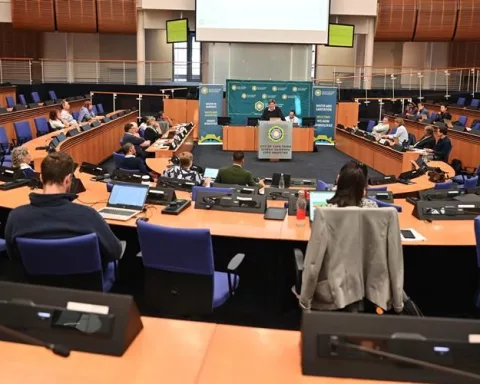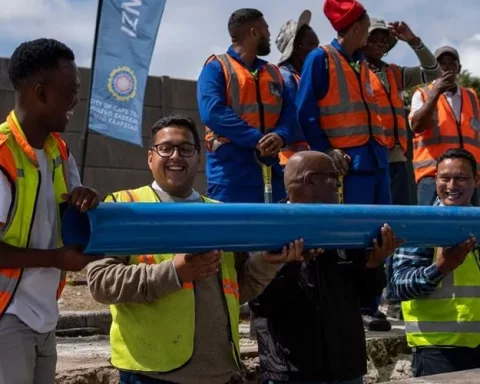Cape Town is leading the way towards a sustainable future by adopting green energy through various projects such as embedded generation, solar, and energy utility reform. The city has secured global technical support from the Deutsche Gesellschaft für Internationale Zusammenarbeit (GIZ) and the German Development Bank (KfW) to fast-track these projects. Cape Town’s commitment to diversifying its energy sources is witnessing steady advancement and is setting a global standard for the adoption of renewable energy.
Cape Town has secured global technical support to enhance its plans for sustainability and aims to adopt green energy through various projects such as embedded generation, solar, and energy utility reform. The Deutsche Gesellschaft für Internationale Zusammenarbeit (GIZ) has partnered with Cape Town to deploy an Embedded Generation Advisor and project managers to drive projects financed through the C40 Climate Finance Facility, while KfW will provide substantial backing to the city’s Power Utility Reform program. The city’s initiatives to diversify its energy sources are witnessing steady advancement.
Cape Town has emerged as a harbinger of sustainable practices, setting a high bar in an era that is witnessing a surge in environmental awareness. The city has recently secured additional global technical support to enhance its plans for sustainability. This crucial step forwards is indicative of the city’s commitment to its transformation towards the adoption of green energy. This generous support is set to fast-track various projects. These include embedded generation, solar, and energy utility reform projects, which are essential for a sustainable framework.
International Support for Green Initiatives
The Deutsche Gesellschaft für Internationale Zusammenarbeit (GIZ), a key German development agency, has entered into a partnership with the city. GIZ’s role includes deploying an Embedded Generation Advisor and deputizing project managers to bolster Cape Town’s green initiatives. These resources play a critical role in driving projects financed through the C40 Climate Finance Facility. Such projects comprise the Green Infrastructure and Improved Catchment Management project and the Paardevlei Solar Farm and Net Zero Carbon Municipal Buildings project.
Additionally, technical assistance has been extended to the German Development Bank (KfW). KfW is set to provide substantial backing to the city’s Power Utility Reform program. This program is in line with the city’s newly approved Energy Strategy. Its ultimate aim is to devise a transformation plan for the utility. The end goal is to maintain sterling service delivery and expand the scope of energy generation sources.
A Strategic Partnership for a Greener Future
Implementing these intricate sustainability initiatives calls for a certain level of proficiency and experience. The international support, which is valued at over R4 million, is thus not just a monetary aid. It is, in fact, a strategic collaboration. Cape Town’s energy initiatives stand to gain significantly from this exchange of knowledge and the adoption of best practices from international experts.
Councillor Beverley Van Reenen, the mayoral committee member for energy, spoke highly of the importance of international support. She offered her gratitude for the technical expertise provided by partners like GIZ and KfW. In her opinion, their contributions not only invigorate the city’s energy initiatives, but they also create an environment that encourages learning and growth.
Progress Towards Energy Diversification
Cape Town’s initiatives aimed at diversifying its energy sources are witnessing steady advancement. Numerous significant projects have already taken off, including Large Power Users (LPUs) and the Power Heroes program. These initiatives aim to promote efficient energy consumption among residential and commercial consumers.
Moreover, a tender has been put out to Independent Power Producers (IPP) to deliver dispatchable and self-dispatchable power capacity. This is expected to amount to a total of 500 MW. It is a part of a broader strategy to diversify electricity suppliers, with the IPP Renewable Energy initiative aiming to generate 200 MW of renewable energy.
The Dispatchable IPP Programme is another critical initiative. It is aimed at mitigating load shedding, a recurrent problem that has been troubling the city. This scheme is a testament to Cape Town’s commitment to not only diversify its energy sources but also to guarantee a reliable energy supply for its citizens.
Setting a Global Standard
In the face of the global climate crisis, Cape Town stands as a trailblazer, creating a global benchmark for the adoption of renewable energy. Through its collective efforts and strategic initiatives, the city has carved a niche for itself as a pioneer in the transition towards a greener, more sustainable future.
1. What is Cape Town doing to become sustainable?
Cape Town is adopting green energy through various projects such as embedded generation, solar, and energy utility reform, and has secured global technical support from the Deutsche Gesellschaft für Internationale Zusammenarbeit (GIZ) and the German Development Bank (KfW) to fast-track these projects.
2. What is the role of the Deutsche Gesellschaft für Internationale Zusammenarbeit (GIZ) in Cape Town’s sustainability initiatives?
GIZ has partnered with Cape Town to deploy an Embedded Generation Advisor and project managers to drive projects financed through the C40 Climate Finance Facility, while KfW will provide substantial backing to the city’s Power Utility Reform program.
3. How is international support helping Cape Town’s sustainability initiatives?
International support is valued at over R4 million and is not just a monetary aid, but a strategic collaboration. Cape Town’s energy initiatives stand to gain significantly from the exchange of knowledge and the adoption of best practices from international experts.
4. What progress has Cape Town made in diversifying its energy sources?
Cape Town’s initiatives aimed at diversifying its energy sources are witnessing steady advancement. Numerous significant projects have already taken off, including Large Power Users (LPUs) and the Power Heroes program. Moreover, a tender has been put out to Independent Power Producers (IPP) to deliver dispatchable and self-dispatchable power capacity.
5. What is the Dispatchable IPP Programme?
The Dispatchable IPP Programme is a critical initiative aimed at mitigating load shedding. It is a testament to Cape Town’s commitment to not only diversify its energy sources but also to guarantee a reliable energy supply for its citizens.
6. How is Cape Town setting a global standard for sustainable practices?
Cape Town is setting a global standard for the adoption of renewable energy through its collective efforts and strategic initiatives, carving a niche for itself as a pioneer in the transition towards a greener, more sustainable future.












